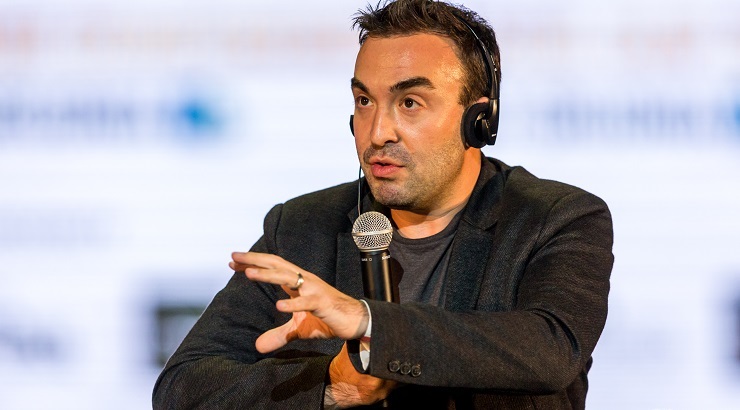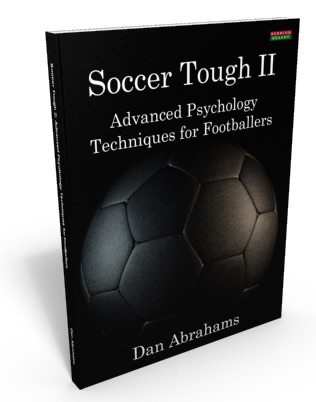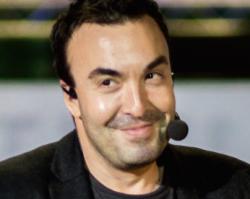Soccer Tough II: Advanced Psychology Techniques for Footballers
Train with Intention – Train with Focus
SoccerToday columnist Dan Abrahams shares his insights and advice for success on the soccer field for players of all ages. A global sport psychologist and author specializing in soccer, Abrahams global sport psychologist and author specializing in soccer, Abrahams is based in England and works with professional soccer players in the English Premier League (EPL). Abrahams has helped hundreds of soccer players – many of them who play in the English Premier League (EPL) and others who play across Europe. A recent example of his work includes helping Yannick Bolasie make an enormous impact on the EPL for Crystal Palace. Abrahams has held contracts with QPR, Fulham, and West Ham among other clubs and works quietly, behind the scenes with many coaches from top clubs across Europe.

Greatness isn’t achieved under the lights in the arena. It’s not achieved in a stadium packed with passionate supporters. It’s not achieved in the quarters or the semis or indeed the final. And it’s not achieved when the ball bulges the back of the net or when a hand tips the penalty kick around the post.
Greatness is a private affair. It’s achieved behind closed doors, away from public gaze, on the relative quiet of the training pitch.
This is how I start chapter four of my new book ‘Soccer Tough II’. In chapter one, I tell the reader to adopt the attitude that there is no limit to their ability. That they have a bottomless pit of potential. In chapter two, I ask soccer players to profile the next level – to get an idea of what better looks like. And in chapter three I detail a way to draw up an individual development plan from that player profile. This is what I call a training script.
Now I want you to go out and train that script. But I don’t want your soccer practice to be average. Nor do I want it to be good. A famous business consultant once wrote that ‘good is the enemy of great’. I love that! I want your training and game practice to be great. I want it to separate you from your peers. I want it to excite you, enthrall you, and focus your mind.
Focus is the most important word here.
From Soccer Tough II: Developing your game takes willpower and discipline of mind as much as it does energy and effort. It takes focus and attention to detail. I’m afraid you can’t just stride onto the training pitch and run around like a headless chicken. And you can’t expect to get better just by turning up.
 You’re going to engage in intentional practice.
You’re going to engage in intentional practice.
Intentional practice is my term for what author of ‘The Talent Code’ calls ‘Deep Practice’. It’s what psychological researcher Anders Ericksen at Florida State University called ‘Deliberate practice.’
Intentional practice is practice on purpose. It’s brain pain. It’s not just turning up and training, and it’s not just training with intensity. It’s training with a mind on improving.
It feels awkward and uncomfortable. It requires stretching away from your comfort zone – what does this look like for you? What does this feel like? To help you answer this question I’d like to introduce you to my four components of intentional practice. They are – Interesting, Intense, Internalised and Integrated. Let’s take you through two of these incredibly important training qualities.
Being Interested
I want soccer players to be passionate about improving their game. Too many say “I’m a really good trainer, I train with intensity”. Not enough say “I’m passionate about improving, I’m gripped by striving to improve my skills”.
Soccer players need to be passionate about learning, improving and developing. They need to be interested in developing skill. If you have a individual training plan that you can take into your club or team training then you immediately turn up the volume of interest. Subsequently you start to focus better.
From Soccer Tough II: Interest turns up the volume of focus. The brain is constantly scanning the environment for things to lock onto – it will bolt itself tight to the most important detail at any given time. What you choose to work on must interest you, must be important to you. You must find what you’re working on significant to your game in order to focus your full attention on it. This is because attention starts the process of brain change. It starts the process of improvement.
Go into training with your own personal goals related to the technical, tactical, physical and mental sides of the game. Go into training striving to be a better passer of the ball, a better tackler, a more confident player, a quicker competitor. Turn up the volume of interest and you’ll speed the building blocks of skill development in every session.
Internalize
Intentional practice requires thought. It’s not just action without judgement. That ‘just do it’ attitude and mindset is more for match day. During training you should be constantly examining the process of your practice:
“Am I keeping my body shape?”
“Did I get into the right position like I wanted to?”
“Have I taken more shots than yesterday?”
“Am I timing my jumps on corners and free kicks better?”
I never read about this vital practice ingredient. I never hear coaches talk about this. Yet to me it’s a mediator of success. To me it’s a determinant of a soccer players trajectory.
Every soccer player, as he or she trains, needs to take some time, have some check-ins, that helps him or her assess their actions, their movements, and their plays. They need to internalize the training as they train.
From Soccer Tough II: By ‘internalise’ I mean to judge what you are doing. I want you build in small pockets of time during practice to ask yourself how well you are executing your script.
“Can I be better?”
“Can I do this with greater intensity?”
“Am I maintaining focus and interest?”
“Am I bang on this at all times?”
“Can I stretch myself more?”
You must be aware of your performance with relation to what you are trying to accomplish. You must have regular self check-ins that affirm how you are going – you are working hard enough or you are not, you are stretching your comfort zone or you are not, you are sticking to your script or you are not.
Improvement
I say all this to you because that is how improvement is done. These two I’s of intentional practice is what learning feels like. That is how soccer players can develop their skills quicker and more effectively.
You may be at training but are you really present? Are you really engaged? Are you really executing your script? Are you stretching and are you broadening your skill set?
Training needs to be intentional. It needs to be interesting, intense, internalised, and integrated.






